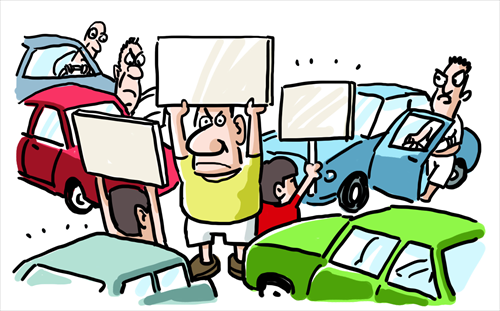HOME >> OP-ED, LAZY PACK
Occupy Central is undermining stability
By Nile Bowie Source:Global Times Published: 2014-10-16 20:28:01

Illustration: Liu Rui/GT
Hong Kong has been brought to a standstill over the past several weeks, as the city's pro-democracy movement clogged major roads and transport arteries, blocking traffic in a sustained campaign of civil disobedience.
Clashes between demonstrators and local business owners, taxi drivers, and other residents have become commonplace due to the strain placed on the economy by the protest movement.
Irrespective of whether one supports the movement or not, it is self-evident that the sustained protest strategy has long ceased to be constructive. The number of participants has dwindled to the low hundreds in most cases.
As evidenced by reports and video footage of chaotic altercations, the persistence of the movement is undermining the city's social fabric and stability. Support for the Occupy camp is also eroding, as business and transport disruptions persist.
Occupy Central is the latest manifestation of an increasingly common kind of movement, whereby a consolidated group of frustrated young demonstrators occupy public areas and refuse to disperse until their demands are met.
Elder protest leaders and opportunistic opposition politicians set the agenda, while hordes of students enforce their demands on the street. Nonetheless, in the push to achieve the goal of the campaign, the negative impact on local businesses and people's lives are of little concern.
While movements like this tend to crop up in highly polarized societies, protestors will shrewdly accept nothing less than their demands, even if they represent a contentious minority position. That these groups sing the praises of "democracy" makes for good satire.
However, to dismiss these movements altogether as an annoyance or threat to public disorder obfuscates important political signals which need to be listened to.
The central government has taken a hands-off approach to Hong Kong, allowing the territory to operate with a high degree of political autonomy.
The large volume of mainlanders who come to Hong Kong as tourists and property buyers have instilled in many the notion that Hong Kong risks being absorbed into the mainland's social and cultural milieu.
It is undeniable that Hong Kong is rife with chauvinist attitudes toward mainlanders. The demonstrations, in turn, have become an avenue for protestors to assert their status and identity, veiled under a homogenizing pro-democracy banner. Mainland reactions to the protests have been lukewarm, because these sentiments can be widely inferred.
Another more obvious factor is economic in nature, pertaining to the territory's soaring income inequality and the increasing difficulty to make ends meet.
The "Hong Kong dream" is fast evaporating, as barriers to home ownership and greater material affluence for young people are getting ever more pronounced.
Most poignantly, there is a major trust deficit toward the current administration that could continue to widen and polarize society.
International media coverage, which has echoed the sympathetic statements made in favor of the protestors by Western governments, has oversimplified the Occupy Central movement by overlooking questions of identity and dislocation.
The movement has been framed through a familiar cookie-cutter narrative that is averse to criticizing the student movement while often exaggerating the extent of police misconduct.
Tear gas was used to disperse the protestors, which had the unintended effect of galvanizing support for the movement, only when students attempted to storm government buildings. In contrast to the heavy-handed conduct and police brutality that have been repeatedly demonstrated in Europe and the US, the actions of the Hong Kong police were highly restrained throughout. These demonstrations have proved beyond doubt that the Hong Kong authorities have respected their citizens' right to assemble.
As it pertains to the territory's Basic Law, the chief executive will be elected by universal suffrage upon nomination by a broadly representative nominating committee.
There is no substance to the allegation that China "reneged on its commitment" to offer universal suffrage, because the law always stipulates that a nominating committee would approve candidates for chief executive.
By selectively reporting from pro-Occupy perspectives, the Western media outlets have created an impression that the central government is suppressing democracy, when in fact the population will be directly electing the chief executive through one-person-one-vote for the first time in history in 2017. The one-person-one-vote system was never a feature of life under British colonial rule.
By 2020, both the chief executive and legislative council will be elected through universal suffrage, representing a move toward popular ballot-box politics. A 1,200-member electoral college currently elects the chief executive. Therefore, the accommodation of direct elections will be undeniably more representative than the current arrangement.
The author is a Malaysia-based political analyst and a columnist with Russia Today. opinion@globaltimes.com.cn
Posted in: Viewpoint, Commentary